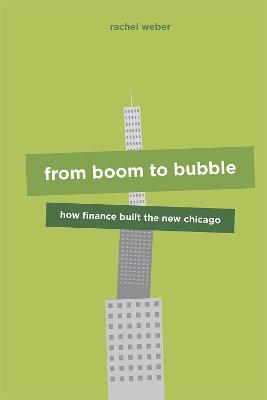
From Boom to Bubble
How Finance Built the New Chicago
Seiten
2015
University of Chicago Press (Verlag)
978-0-226-29448-3 (ISBN)
University of Chicago Press (Verlag)
978-0-226-29448-3 (ISBN)
During the Great Recession, the housing bubble took much of the blame for bringing the American economy to its knees, but commercial real estate also experienced its own boom-and-bust in the same time period. In Chicago, for example, law firms and corporate headquarters abandoned their historic downtown office buildings for the millions of brand-new square feet that were built elsewhere in the central business district. What causes construction booms like this, and why do they so often leave a glut of vacant space and economic distress in their wake? In From Boom to Bubble, Rachel Weber debunks the idea that booms occur only when cities are growing and innovating. Instead, she argues, even in cities experiencing employment and population decline, developers rush to erect new office towers and apartment buildings when they have financial incentives to do so. Focusing on the main causes of overbuilding during the early 2000s, Weber documents the case of Chicago's "Millennial Boom," showing that the Loop's expansion was a response to global and local pressures to produce new assets.
An influx of cheap cash, made available through the use of complex financial instruments, helped transform what started as a boom grounded in modest occupant demand into a speculative bubble, where pricing and supply had only tenuous connections to the market. Innovative and compelling, From Boom to Bubble is an unprecedented historical, sociological, and geographic look at how property markets change and fail-and how that affects cities.
An influx of cheap cash, made available through the use of complex financial instruments, helped transform what started as a boom grounded in modest occupant demand into a speculative bubble, where pricing and supply had only tenuous connections to the market. Innovative and compelling, From Boom to Bubble is an unprecedented historical, sociological, and geographic look at how property markets change and fail-and how that affects cities.
Rachel Weber is associate professor in the Urban Planning and Policy Department and a faculty fellow in the Great Cities Institute at the University of Illinois at Chicago. She is the author of Swords into Dow Shares: Governing the Decline of the Military Industrial Complex and coeditor of the Oxford Handbook for Urban Planning. She was a member of the Urban Policy Advisory Committee for then-presidential candidate Barack Obama and appointed to the Tax Increment Financing Reform Task Force by Chicago Mayor Rahm Emanuel.
| Reihe/Serie | Emersion: Emergent Village resources for communities of faith |
|---|---|
| Sprache | englisch |
| Maße | 17 x 23 mm |
| Gewicht | 567 g |
| Themenwelt | Naturwissenschaften ► Geowissenschaften ► Geografie / Kartografie |
| Sozialwissenschaften ► Soziologie | |
| Technik ► Architektur | |
| Wirtschaft ► Betriebswirtschaft / Management ► Rechnungswesen / Bilanzen | |
| Wirtschaft ► Volkswirtschaftslehre ► Makroökonomie | |
| ISBN-10 | 0-226-29448-X / 022629448X |
| ISBN-13 | 978-0-226-29448-3 / 9780226294483 |
| Zustand | Neuware |
| Informationen gemäß Produktsicherheitsverordnung (GPSR) | |
| Haben Sie eine Frage zum Produkt? |
Mehr entdecken
aus dem Bereich
aus dem Bereich
über eine faszinierende Welt zwischen Wasser und Land und warum sie …
Buch | Hardcover (2023)
dtv (Verlag)
24,00 €
Buch | Hardcover (2024)
Schweizerbart'sche, E. (Verlag)
24,00 €


